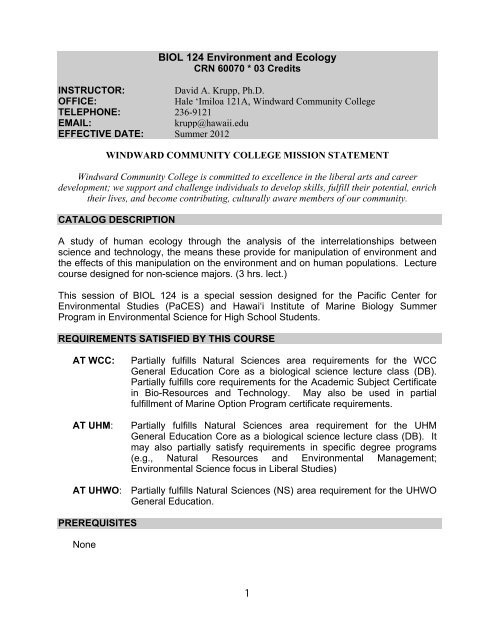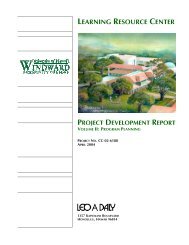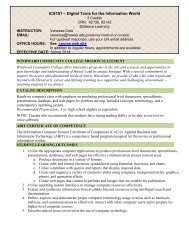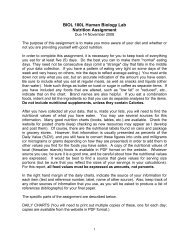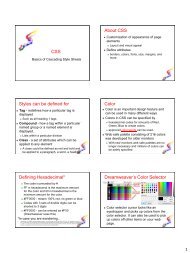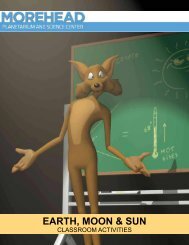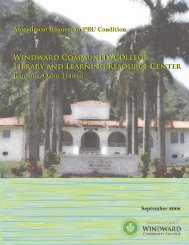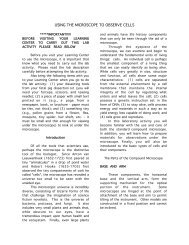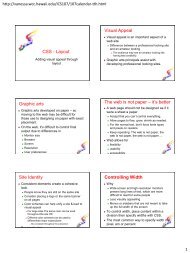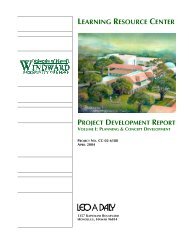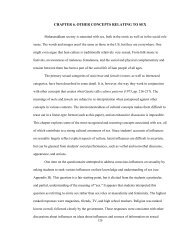Course Outline (pdf)
Course Outline (pdf)
Course Outline (pdf)
You also want an ePaper? Increase the reach of your titles
YUMPU automatically turns print PDFs into web optimized ePapers that Google loves.
BIOL 124 Environment and Ecology<br />
CRN 60070 * 03 Credits<br />
INSTRUCTOR:<br />
David A. Krupp, Ph.D.<br />
OFFICE:<br />
Hale ‘Imiloa 121A, Windward Community College<br />
TELEPHONE: 236-9121<br />
EMAIL:<br />
krupp@hawaii.edu<br />
EFFECTIVE DATE: Summer 2012<br />
WINDWARD COMMUNITY COLLEGE MISSION STATEMENT<br />
Windward Community College is committed to excellence in the liberal arts and career<br />
development; we support and challenge individuals to develop skills, fulfill their potential, enrich<br />
their lives, and become contributing, culturally aware members of our community.<br />
CATALOG DESCRIPTION<br />
A study of human ecology through the analysis of the interrelationships between<br />
science and technology, the means these provide for manipulation of environment and<br />
the effects of this manipulation on the environment and on human populations. Lecture<br />
course designed for non-science majors. (3 hrs. lect.)<br />
This session of BIOL 124 is a special session designed for the Pacific Center for<br />
Environmental Studies (PaCES) and Hawai‘i Institute of Marine Biology Summer<br />
Program in Environmental Science for High School Students.<br />
REQUIREMENTS SATISFIED BY THIS COURSE<br />
AT WCC:<br />
AT UHM:<br />
Partially fulfills Natural Sciences area requirements for the WCC<br />
General Education Core as a biological science lecture class (DB).<br />
Partially fulfills core requirements for the Academic Subject Certificate<br />
in Bio-Resources and Technology. May also be used in partial<br />
fulfillment of Marine Option Program certificate requirements.<br />
Partially fulfills Natural Sciences area requirement for the UHM<br />
General Education Core as a biological science lecture class (DB). It<br />
may also partially satisfy requirements in specific degree programs<br />
(e.g., Natural Resources and Environmental Management;<br />
Environmental Science focus in Liberal Studies)<br />
AT UHWO: Partially fulfills Natural Sciences (NS) area requirement for the UHWO<br />
General Education.<br />
PREREQUISITES<br />
None<br />
1
Windward Community College BIOL 124 Environment and Ecology D.A. Krupp<br />
STUDENT LEARNING OUTCOMES<br />
By the end of this class, the student should be able to<br />
1. Explain the process and philosophical basis of scientific inquiry.<br />
2. Describe the basic principles of ecology, including population ecology, community<br />
ecology, and ecosystem function.<br />
3. Describe the characteristics of the major biomes and ecosystems of the Earth.<br />
4. Describe the interrelationships between land, sea, the atmosphere and the living<br />
things that occupy these environments.<br />
5. Discuss the role that humans play in affecting the characteristics of the environment.<br />
6. Evaluate current environmental issues and problems including the solutions and<br />
management practices that have been used or offered to address these issues and<br />
problems.<br />
COURSE OBJECTIVES<br />
To help you achieve the course objectives, you may be provided with lecture outlines<br />
that include vocabulary terms and study questions that you are required to know. You<br />
should use these outlines as guides to help you focus on what materials to study. The<br />
general course content objectives are listed below.<br />
Ø The student will demonstrate understanding of some of the major principles of<br />
science specified below:<br />
• the philosophy and characteristics of science and the scientific method;<br />
• the difference between hypotheses, theories and laws in science;<br />
Ø The student will describe and integrate basic information related to ecology and<br />
environmental science. This information includes the following:<br />
• ecosystems, their structure (trophic relationships, abiotic factors, and biomes)<br />
and function (energy flow and biogeochemical cycles);<br />
• population growth and the factors influencing this growth;<br />
• ecological succession and the role of environmental disturbance in this<br />
process;<br />
• water, watersheds, and the hydrologic cycle;<br />
• soil, its characteristics and formation.<br />
Ø The student will describe and integrate basic information related to human<br />
utilization of resources and how human activities impact the environment. This<br />
information includes, but is not limited to, the following:<br />
• the relationships between development (urban, industrial, agricultural, etc.),<br />
human population growth, and the environment;<br />
• how we as humans extract, utilize, and manage resources (e.g., water,<br />
agriculture, natural products, building materials, energy, etc.);<br />
2
Windward Community College BIOL 124 Environment and Ecology D.A. Krupp<br />
• how humans impact environments locally through the utilization of resources<br />
and production of wastes (deforestation, desertification, erosion, overutilization<br />
of resources, sewage, toxic industrial wastes, species introductions,<br />
pest controls, local air pollution, acid precipitation, and non-point source<br />
pollution);<br />
• how humans impact the global environment through the utilization of<br />
resources and production of wastes (ozone depletion, the greenhouse effect,<br />
and global climate change);<br />
• the relationships between the environment, human health, the economy, and<br />
public policy;<br />
• the difference between renewable and non-renewable resources and how the<br />
management of these resources relate to sustainability.<br />
Ø The student will be able to communicate the concepts of environmental science<br />
using the vocabulary and language of the field.<br />
MODE OF INSTRUCTION<br />
The previously described objectives will be achieved through the aid of assigned<br />
readings, class lectures, films, demonstrations, and discussions. The material<br />
presented in all modes of instruction will be of an introductory nature but sufficient in<br />
content to allow serious study by the interested student. Assigned readings will serve to<br />
provide background and supplemental information to provide a broad base for a basic<br />
study of environmental science. Class lectures will build upon this base, helping to<br />
focus the student to some of the more important details.<br />
EVALUATION OF CONTENT OBJECTIVE ACHIEVEMENT<br />
QUIZZES. The student will take a total of 15 quizzes (10 points each), administered via<br />
Laulima. Each quiz will assess the student's knowledge and understanding of<br />
information presented in the text readings and lectures. The student will be able to refer<br />
to his/her lecture notes (but not handouts nor other resources) while taking the quiz.<br />
JOURNAL The student will maintain a journal, which will include the major things that<br />
was learned each day. At the end of each day, the student will identify three key<br />
concepts that were learned that day by describing the concepts and explaining why they<br />
were important These learning logs will be inspected several times during the program<br />
(100 points total).<br />
ATTENDANCE AND PARTICIPATION. The student will attend and actively participate<br />
in all regularly scheduled lecture presentations (150 points total).<br />
3
Windward Community College BIOL 124 Environment and Ecology D.A. Krupp<br />
METHOD OF GRADING<br />
The assignment of points will be according to the following protocol:<br />
Quizzes<br />
Journal<br />
Attendance and Participation<br />
TOTAL<br />
150 points<br />
100 points<br />
150 points<br />
400 points<br />
Letter grades will be assigned as follows:<br />
A<br />
B<br />
C<br />
D<br />
F<br />
I<br />
N<br />
90% or above in total.<br />
80-89% of total points.<br />
70-79% of total points.<br />
60-69% of total points.<br />
Below 60% of total points; also informal or incomplete official withdrawal<br />
from course.<br />
Incomplete; given at INSTRUCTORS OPTION when student is unable to<br />
complete a small part of the course because of circumstances beyond his<br />
or her control. It is the STUDENT'S responsibility to make up incomplete<br />
work with a minimum level (or better) of achievement. Failure to<br />
satisfactorily make up incomplete work within the appropriate time period<br />
will result in a grade change for "I" to the contingency grade identified by<br />
the instructor (see catalog).<br />
NOT GIVEN BY THIS INSTRUCTOR EXCEPT UNDER EXTREMELY<br />
RARE CIRCUMSTANCES (e.g., documented serious illness or<br />
emergency that prevents the student from officially withdrawing from the<br />
course); never used as an alternative for an "F" grade;<br />
No retests will be given. A student missing a quiz because of an illness or legitimate<br />
emergency (formal documentation of the illness or emergency may be required) may<br />
take a make-up quiz only during the FIRST class meeting to which the student returns.<br />
In such a circumstance, the student should make every reasonable attempt to contact<br />
the instructor before the quiz is administered to the class (or as soon as possible). It is<br />
also the student's responsibility to contact the instructor regarding the need to make up<br />
a missed quiz. Make up quizzes, while covering the same information areas as that of<br />
the missed quiz, may use a different format (e.g. comprehensive essay questions rather<br />
than short-answer objective questions) and may be composed of different questions.<br />
Waiver of minimum level of achievement will be given only in unique situations at the<br />
instructor's discretion.<br />
Students involved in academic dishonesty will receive an "F" grade for the course.<br />
4
Windward Community College BIOL 124 Environment and Ecology D.A. Krupp<br />
STUDENT RESPONSIBILITIES<br />
Students are expected to attend all lectures, participate in all activities and complete all<br />
course assignments on time.<br />
Students are expected to be prepared in advance when they arrive to class. Being<br />
prepared includes the following: having already read text materials (e.g. textbook<br />
readings and handouts) assigned for that day's activities; bringing required work<br />
materials (e.g., writing supplies, notebooks, etc.); and wearing clothing appropriate for<br />
the activity.<br />
Any changes in the course schedule, such as assignment dates, deadlines, etc., will be<br />
announced ahead of time in class. It is the student's responsibility to be informed of<br />
these changes.<br />
The student should not assume that the lack of prerequisites for this class ensures a<br />
low level of difficulty for this course. While the instructor assumes that students enrolled<br />
in BIOL 124 have little or no science backgrounds, the students should expect a level of<br />
difficulty comparable to other 100-level science classes. When difficult concepts and<br />
detailed information are presented, it is the student's responsibility to take the<br />
appropriate steps to learn and understand these concepts and information.<br />
Science courses at W.C.C. generally require three hours home study time for each hour<br />
in class. Remember that this lecture/lab class meets for six hours each week.<br />
DISABILITIES ACCOMMODATION STATEMENT<br />
If you have a physical, sensory, health, cognitive, or mental health disability that could<br />
limit your ability to fully participate in this class, you are encouraged to contact the<br />
Disability Specialist Counselor to discuss reasonable accommodations that will help you<br />
succeed in this class. Ann Lemke can be reached at 235-7448, lemke@hawaii.edu, or<br />
you may stop by Hale ‘Ākoakoa 213 for more information.<br />
5


